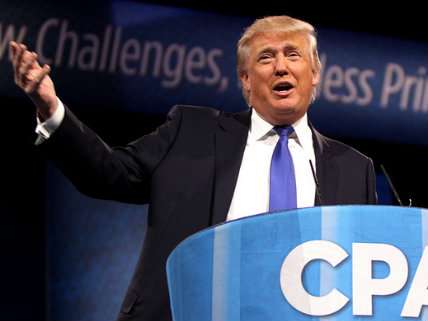3 Takeaways From the Super Tuesday Primary Elections
A good night for Trump and Clinton, and a bad night for Rubio.

Super Tuesday election results are still trickling in, but the endgames for both the Republican and Democratic primary races are becoming increasingly clear, as both Donald Trump and Hillary Clinton, respectively, now look poised to win their party nominations. With the basic shape of the evening and the race now becoming clear, here are three quick takeaways from tonight's race:
1) Donald Trump had a very good night. Trump won in Georgia, Virginia, Tennessee, Massachusetts, Alabama, and Arkansas, adding to the wins he'd already notched in New Hampshire, South Carolina, and Nevada. Perhaps the biggest of these wins was in Virginia, where Rubio, buoyed by support from Northern Virginia—which is literally the home of the Republican establishment—had hoped to eke out a victory. Trump's message in his odd victory press conference event was that he is a unifier, a descriptor he repeated multiple time. And while it's harder to make that case nationally given that 60 percent of the country says it has a negative view of Trump, it certainly seems that he is uniting the GOP, or at least its primary voters, around his candidacy. It is still possible for Trump to lose, but at this point he should be treated as something like, or at least close to, the presumptive nominee.
2) Marco Rubio did not have a great night. After a feisty debate last week, and surge of media interest over the weekend, the Florida senator had hoped to come away from tonight looking like the candidate best positioned to beat Trump in a one on one contest. Rubio slightly overperformed his polls, and he won Minnesota—but so far that is his only state victory. Instead, Texas Sen. Cruz stole some of Rubio's thunder by winning primary contests in both Texas and Oklahoma, furthering Cruz's argument that he has notched the most victories over Trump, and is therefore the candidate who has most demonstrated he can beat him. In the end, both candidates come away with plausible—though not exceptionally strong—cases that they can beat Trump in a head to head contest. Given their equally plausible claims, it may be that the most effective method of stopping Trump is for them to both stay in, siphon off delegates, and prevent Trump from getting the number necessary to win.
3) Hillary Clinton is already running against Trump. Clinton won multiple victories tonight, putting her on a clear path to winning the Democratic nomination. And so her victory speech tonight was essentially a test-version of her general election pitch against Trump. Throughout her remarks, she alluded to Trump and his campaign. "The stakes have never been higher" she said "and the rhetoric we're hearing on the other side has never been lower." Referencing Trump's endless promises to build a wall along the southern border, she said that "instead of building walls we're going to break down barriers." Riffing on Trump's campaign slogan, Clinton said "America never stopped being great" and declared that "we have to make America whole." Clinton's speech, in other words, was essentially a quick take on the state of the Republican race—and she was calling it for Donald Trump.
Bonus takeaway: There's no candidate for libertarians to root for in the race. While it may be that libertarians find themselves backing one candidate or another in hope that some other candidate—say, Donald Trump—will lose, it's hard to find much for libertarians to positively latch onto in this race, which has descended into a contest between a super-hawk, a preachy social conservative, and a nativist authoritarian on one side, and a semi-socialist (who won't win) and a hawkish big-government liberal on the other.


Show Comments (83)